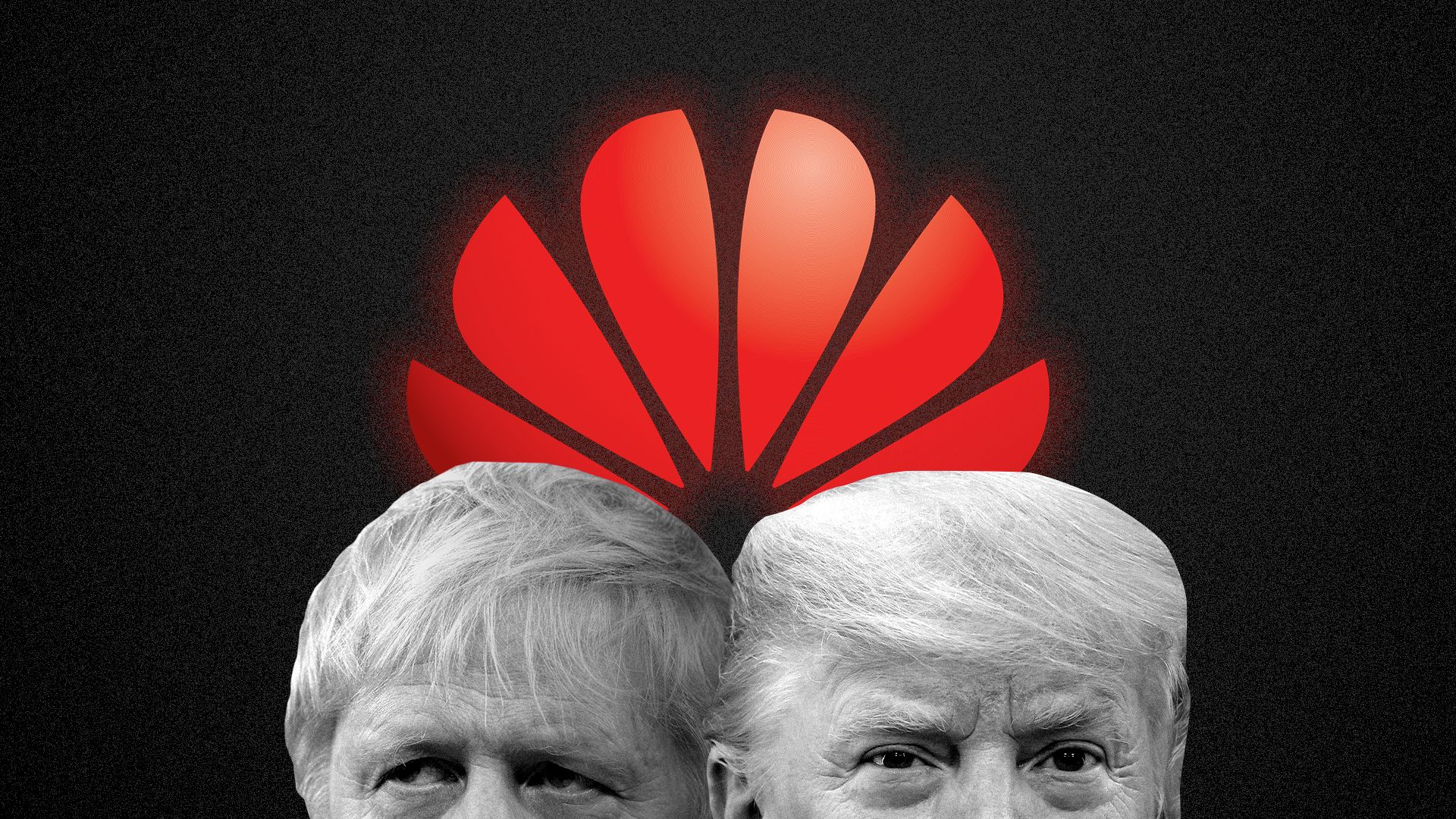
Illustration: Aïda Amer/Axios. Photos: Leon Neal/Getty Staff, Fabrice Coffrini/Getty Contributor
British Prime Minister Boris Johnson is inching toward a decision that could profoundly harm the "special relationship" between Britain and the United States under President Trump.
Driving the news: Johnson is expected to decide, as soon as this week, whether to defy Trump's request that he ban Chinese technology giant Huawei from the U.K.'s 5G wireless network.
- Johnson's decision comes after repeated private and public warnings from Trump and senior administration officials, including Treasury Secretary Steven Mnuchin, Secretary of State Mike Pompeo and national security adviser Robert O'Brien, U.S. officials tell Axios.
Behind the scenes: "This is a highly consequential decision that the British prime minister's going to be making," a senior Trump administration official told me in a phone interview on Saturday.
- "Not only in terms of their relationship with the United States, but first and foremost for their own citizens," added the official, who spoke on condition of anonymity because of the sensitive diplomacy still happening across the Atlantic.
- "People are going to be a bit shaken by the U.K.'s judgment if they make this decision."
Why it matters: The Huawei debate — which may seem abstract to many Americans — has become one of the most urgent foreign policy priorities of the Trump administration and one of the more serious tests of the U.S.-U.K. relationship in recent times.
- It could ultimately lead to the U.S. government curtailing the intelligence it shares with its closest ally, U.S. officials told Axios.
- Some British officials have countered that, with severe restrictions, it's possible to safely include Huawei equipment in a 5G network.
Former Australian Prime Minister Malcolm Turnbull has been a leading voice, globally, in warning about the risks of allowing the Chinese company to embed itself in western mobile networks.
- Turnbull told me in a phone interview on Saturday that he shared his assessment of Huawei with the Trump administration in early 2017. (Australia is part of America's most important intelligence-sharing alliance, the "Five Eyes.")
- Turnbull said he spent a lot of time personally investigating the subject in consultation with Five Eyes partners.
- "To be honest with you, I'm surprised that the U.K. is taking the approach it is," Turnbull said. "The ability to mitigate the risk is very, very questionable."
The big picture: The battle over Huawei is what a "tech Cold War" begins to look like.
- In recent remarks at the the Raisina Dialogue in New Delhi, Trump's deputy national security adviser Matthew Pottinger said: "Can you imagine a situation where, in the '80s, Ronald Reagan and Margaret Thatcher have a conversation and they say, 'You know, I think we should have the KGB come and build all of our telecommunications and computer network systems because they're offering a great discount.'"
Between the lines: 5G mobile networks will allow humans and machines to communicate at unfathomable speeds. When people talk about the Internet of Things, they are referring to a world in which everything from driverless cars to home appliances to hospital equipment will be connected and constantly exchanging data.
- "When you're talking about 5G, everything will become critical infrastructure," said the senior Trump official.
- Some countries, including the U.S. and Australia, have banned Huawei from providing equipment for 5G. Intelligence and national security analysts in these countries have determined that once Chinese gear is embedded in the network, there is no way of guaranteeing that the Chinese state won't use it for nefarious purposes.
- Top officials in the Five Eyes have privately discussed nightmare scenarios ranging from the Chinese government forcing Huawei to conduct mass-scale spying on foreign citizens to more extreme scenarios.
- Some worry that China, in a future conflict with a Western country, could use its embedded Huawei gear to disrupt critical infrastructure.
The other side: Senior government officials inside the U.K. and Germany have claimed it's possible to safely include Huawei in mobile networks, so long as it is restricted and kept away from "core" elements of the network. Senior Trump administration officials, and others like Turnbull, say this is not possible.
- British and German officials also say they can't afford to exclude Huawei. They say that doing so would leave their countries with unaffordable alternatives and would leave them behind in the global technology race.
- Axios' China reporter Bethany Allen-Ebrahimian, who attended the World Economic Forum in Davos last week, reported that business leaders aren't buying U.S. rhetoric about Huawei being dangerous (or at least, this is their public line). And, generally speaking, they aren't fans of the U.S.-China battle over Huawei.
What's next: The senior Trump administration official said allies should work with the U.S. to quickly develop affordable alternatives to Huawei.
- One option is for the U.S. government to provide Huawei's competitors with subsidies — the same tactic the Chinese have used to give Huawei an unfair advantage over its competitors.
- But the Trump official said there are other, more market-friendly ways, such as tax breaks, that the U.S. government can use to incentivize trusted tech companies.
The bottom line: The Trump official said the administration is still hopeful that Johnson and Angela Merkel might change their minds and ban Huawei. Merkel, in particular, is under pressure from some of her colleagues to block Huawei from Germany's 5G network.
- "Yogi Berra, it ain't over till it's over," the senior Trump administration official said.
- Pompeo framed the choice starkly in a Sunday tweet: "The UK has a momentous decision ahead on 5G. British MP Tom Tugendhat gets it right: 'The truth is that only nations able to protect their data will be sovereign.'"
Go deeper:
